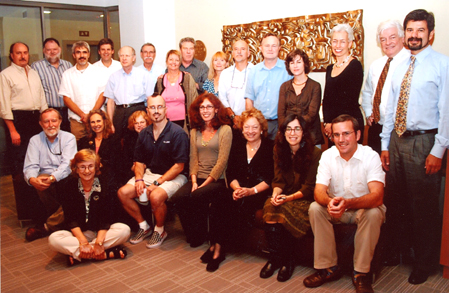Evolutionary Anthropology at the Interface
Date
Oct 4-7, 2007Organized by
Jane Phillips-Conroy and Jeff RogersLocation
Wenner-Gren Foundation and New York University, New York, NYPublications
Evolutionary Anthropology at the Interface, Current Anthropology, Vol. 50, S2, April 2009.Participants
- Leslie Aiello Wenner-Gren Foundation, USA
- Susan Alberts Duke U., USA
- Louise Barrett U. Lethbridge, Canada
- Brenda R. Benefit New Mexico State U., USA
- James M. Cheverud Washington U. School of Medicine, USA
- Eric Delson American Museum of Natural History, USA
- Anthony DiFiore New York U., USA
- Todd R. Disotell New York U., USA
- Terry Harrison New York U., USA
- Peter Henzi U. Lethbridge, Canada
- Nina Jablonski Penn State U., USA
- Clifford Jolly New York U., USA
- Steve Leigh U. Illinois, USA
- Robert D. Martin Field Museum, USA
- Don J. Melnick Columbia U., USA
- Jane Phillips-Conroy Washington U. School of Medicine, USA
- Jeff Rogers Southwest National Primate Reserch Center, USA
- Pat Shipman Penn State U., USA
- Karen Strier U. Wisconsin, USA
- Trudy R. Turner U. Wisconsin, USA
- Linda Vigilant Max Planck Institute for Evolutionary Anthropology, Germany
- Alan Walker Penn State U., USA
- Ken Weiss Penn State U., USA
- Patricia L. Whitten Emory U., USA
- Derek Wildman Wayne State U., USA
ORGANIZER’S STATEMENT: “Evolutionary Anthropology at the Interface” was a two-day event held to celebrate the many significant contributions Clifford Jolly has made and continues to make to biological anthropology and to highlight the current state of the field in general. Cliff’s long and remarkably successful career illustrates the value and impact of integrating evidence and concepts from disparate fields in the service of the broad goals of biological anthropology. He has made substantive and lasting contributions to the interpretation of the human fossil record, to both knowledge of and methods used in the study of natural populations of living primates, to laboratory procedures for investigating those primates, and to the conceptual framework that biological anthropologists employ to understand evolutionary diversity within and among primate species.
The first day of the meeting was held at the Wenner-Gren Foundation and included presentations and commentary by 24 participants, addressing four questions: (1) How can population genetics and endocrinology inform our understanding of primate behavior, ecology, and demography?, (2) What are the independent and shared roles of comparative anatomy, morphological cladistics, and molecular systematics as we continue to investigate the history and mechanisms of primate and human evolution, (3) How does progress in developmental genetics and molecular embryology contribute to our analysis and interpretation of primate paleontology and evolution?, and (4) How will access to the complete DNA sequences of humans, chimpanzees, and other primates affect biological anthropology?
The second day was an open event sponsored by the Center for the Study of Human Origins at New York University. Four of the discussants from the previous day presented lectures on one of the four workshop questions and prepared formal papers for the occasion. Lecturers were Karen Strier, Linda Vigilant, Alan Walker, and Kenneth Weiss.
Participants concluded that biological anthropology has a rich and exciting future that will continue to build on the types of creative, synthetic analyses that Cliff Jolly has effectively pursued throughout his career.
